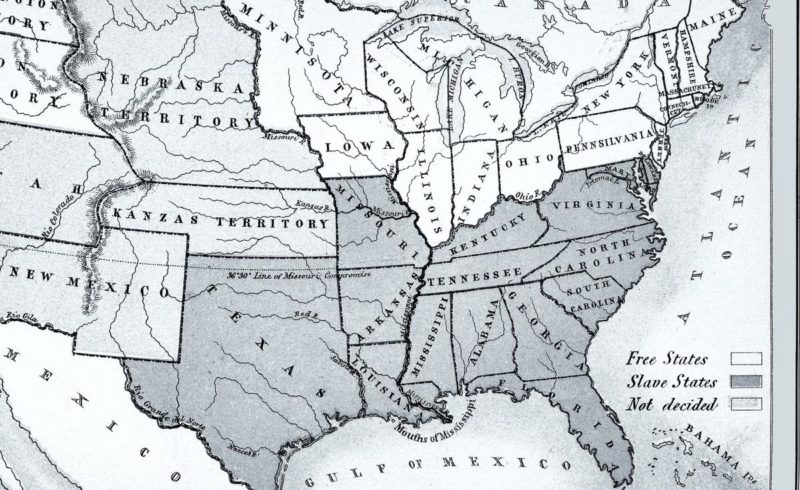Category Archive: 6b.) Mises.org
When Slave Owners Chose Federal Power over Local Sovereignty
A recurring theme in American politics is the cynical use of federal power by those who simultaneously pretend to favor "states' rights" or "local control." We see this today when Republicans one minute say they favor local control with gun laws or Obamacare—and then demand the federal government impose nationwide drug prohibitions. We see it among Democrats who want local control over "sanctuary cities" for illegal...
Read More »
Read More »
Cracked-Up Slobodian
Crack-Up Capitalism: Market Radicals and the Dream of a World without Democracyby Quinn SlobodianMetropolitan Books, 2023; 336 pp.
Quinn Slobodian, a professor of the history of ideas at Wellesley College, has a good deal to say about Murray Rothbard, and I have attempted to respond to that in a review that is to be published in the next issue of The Austrian. Slobodian also includes some comments on the Mises Institute, Lew Rockwell, and...
Read More »
Read More »
Socialists Should Support Government Default: Their Forebears Certainly Did
Socialists like Bernie Sanders and the editors of Jacobin have decried the possible US government debt default. Marx and Lenin would have vociferously disagreed.
Original Article: "Socialists Should Support Government Default: Their Forebears Certainly Did"
Read More »
Read More »
Cultural Change Is Necessary for Capital Development
Preserving culture is so crucial to a group’s identity that it has become sacred. For many the contents of culture don’t matter as long as they are preserved. But such a nihilistic approach to culture has led to failure and will continue to do so. Culture is a social technology that allows societies to function within a specific institutional setting. So, a constellation of traits could be useful for people living in a premodern setting but...
Read More »
Read More »
America: A Nation of Debt
On this episode of Good Money with Tho Bishop, Ryan McMaken joins the show to talk about America's debt crisis. Tho and Ryan discuss both the damage done to the economy by runaway government spending, as well as how Federal Reserve policy has incentivized consumption and punished savings, which has resulted in record-high credit card debt.
Good Money listeners can order a special $5 book bundle that includes How To Think About the Economy...
Read More »
Read More »
The Problem with Nationalism
Ryan, Tho, and Kerry Baldwin take a look at why some politicians say they're "nationalists." Is nationalism a good thing or is it just another way to justify more government meddling in our lives?
New Radio Rothbard mugs are now available at the Mises Store. Get yours at Mises.org/RothMug
PROMO CODE: RothPod for 20% off
Read More »
Read More »
My Forty-Year War on Reefer Madness
Forty years ago last week, the Los Angeles Herald Examiner published my first attack on the federal drug war. The previous year, the Reagan administration had unleashed its “Just Say No” program, vilifying anyone who smoked a joint, sniffed the wrong powder, or used nonapproved hallucinogens. I was mortified to see Ronald Reagan—who was elected on a promise to get “government off your backs”—double-cross his supporters with what morphed into the...
Read More »
Read More »
Huerta de Soto Reigns in Spain
Jesús Huerta de Soto, who is professor of economics at the Rey Juan Carlos University of Madrid, is the leading representative of the Austrian school of economics in Spain. He is a renowned teacher, and two of his many doctoral students, David Howden and Philipp Bagus, both now themselves professors of economics, have edited a festschrift in his honor. The contributors include students, colleagues, friends, teachers, two of his daughters, and his...
Read More »
Read More »
Licensing Laws Deepen South Africa’s Electricity Crisis
South Africa is suffering from rolling blackouts and other power outages. These could be avoided if the government would permit competition in electricity markets.
Original Article: "Licensing Laws Deepen South Africa's Electricity Crisis"
Read More »
Read More »
The Major Cause of Mass Poverty in Sudan
Mere days prior to its receiving renewed attention because of an ongoing civil war, Sudan and many other African countries were (and still are) being promoted by news organizations as citadels of suffering. Viewers are subjected to heart-wrenching images: The gaunt, skeletal bodies of starved children crying out in hunger. Families left with only emaciated cows, selling sticks to produce some kind of livelihood. After observing these agonizing...
Read More »
Read More »
In DeLong Run …
J. Bradford DeLong, who teaches economics at UC Berkeley and was a protégé of Larry Summer's dislikes Austrian economics, which he sometimes assails on his blog. You might reasonably expect that for this reason, I will lambaste his book, which, to no one’s surprise, defends Keynesian economics and the welfare state. But I’m going to disappoint expectations. The book contains a number of insights that merit highlighting, albeit accompanied by some...
Read More »
Read More »
A Guide to Good Money: An Interview with Brendan Brown
Ryan McMaken (RM): There is a lot of talk these days about the US losing its global monetary hegemony. But a lot needs to happen in terms of unwinding the present system before that can happen. At the heart of this seems to be what you call “globalized money without a global money.” What do you mean by that, and what does it have to do with the dollar’s global importance?
Brendan Brown (BB): Globalization of money under the fiat regime magnifies...
Read More »
Read More »
The Road to Civil War
[This article is excerpted from a 30,000-word memo to the Volker Fund, 1961. The full memo is available in Strictly Confidential: The Private Volker Fund Memos of Murray N. Rothbard edited by David Gordon.]
The Road to Civil War
The road to Civil War must be divided into two parts:
the causes of the controversy over slavery leading to secession, andthe immediate causes of the war itself.The reason for such split is that secession need not have led...
Read More »
Read More »
Wilhelm von Humboldt’s Demarcation of the Limits of State Activity
Not many are aware that one of the greatest works against the encroachment of the state originates from a German thinker. As early as the late eighteenth century, Wilhelm von Humboldt (1767–1835) raised the question of the general limits of state activity. Humboldt wrote his Ideas for an Attempt to Determine the Limits of the Effectiveness of the State in 1792. While individual sections of it appeared in the Berlinische Monatsschrift, the complete...
Read More »
Read More »
Demonizing Men with False Data on Sexual Abuse
In today's progressive climate, sexual assault charges are easy to make and hard to refute, even when they are demonstrably false.
Original Article: "Demonizing Men with False Data on Sexual Abuse"
Read More »
Read More »
Is Microsoft-Activision Opposition a Repetition of Vons-Shopping Bag?
President Joe Biden’s Federal Trade Commission (FTC) appointees have an affinity for returning to an earlier era’s antitrust enforcement, sometimes summarized as a “big is bad” or “neo-Brandeisian” approach. The most famous (or notorious) current example is the FTC’s opposition to the proposed merger between Microsoft and Activision.
In their words, the merger would give Microsoft “both the means and motive to harm competition.” How could that...
Read More »
Read More »
Will the Fed Ever Relinquish Its New Powers?: The Fed’s “Cincinnatian Problem”
In times of banking and financial crises, central banks always intervene. This is not a law of nature, but it is an empirical law of central bank behavior. The Federal Reserve was created 110 years ago specifically to address banking panics by expanding money and credit when needed, by providing what was called in the Federal Reserve Act of 1913 an “elastic currency,” so it could make loans in otherwise illiquid markets, when private institutions...
Read More »
Read More »
From the Editor May/June
When I was an economics undergraduate back in the 1990s, central bankers at the Federal Reserve were more or less above criticism. Those were the days when Alan Greenspan was acclaimed as “the maestro” and it was simply assumed central bankers could skillfully plan the economy to ensure growing prosperity forever. This isn’t an exaggeration. In 1998, the Wall Street Journal published an op-ed by MIT economist Rudi Dornbusch claiming that we have. ....
Read More »
Read More »
3 Things to Remember on Independence Day
It's difficult to say what most Americans commemorate or celebrate on Independence Day nowadays. Many appear to focus on some vague notion of "America." Others even take to jingoism equating the United States government with the very notion of "freedom."
Lost in all of this is the fact that the Declaration of Independence — the document we're supposed to remember today — is a document that promotes secession, rebellion, and...
Read More »
Read More »
Do Boycotts Really Work? Another Look at the Bud Light Situation
Some conservatives are upset because the new best-selling beer is owned by the same company that owns the beleaguered Bud Lite. Actually, they should have no problem with that.
Original Article: "Do Boycotts Really Work? Another Look at the Bud Light Situation"
Read More »
Read More »





























